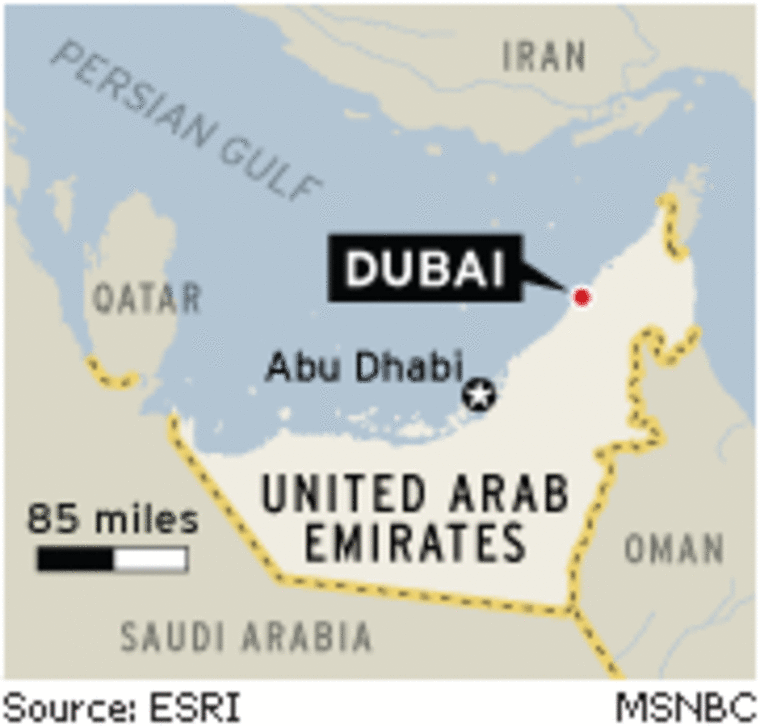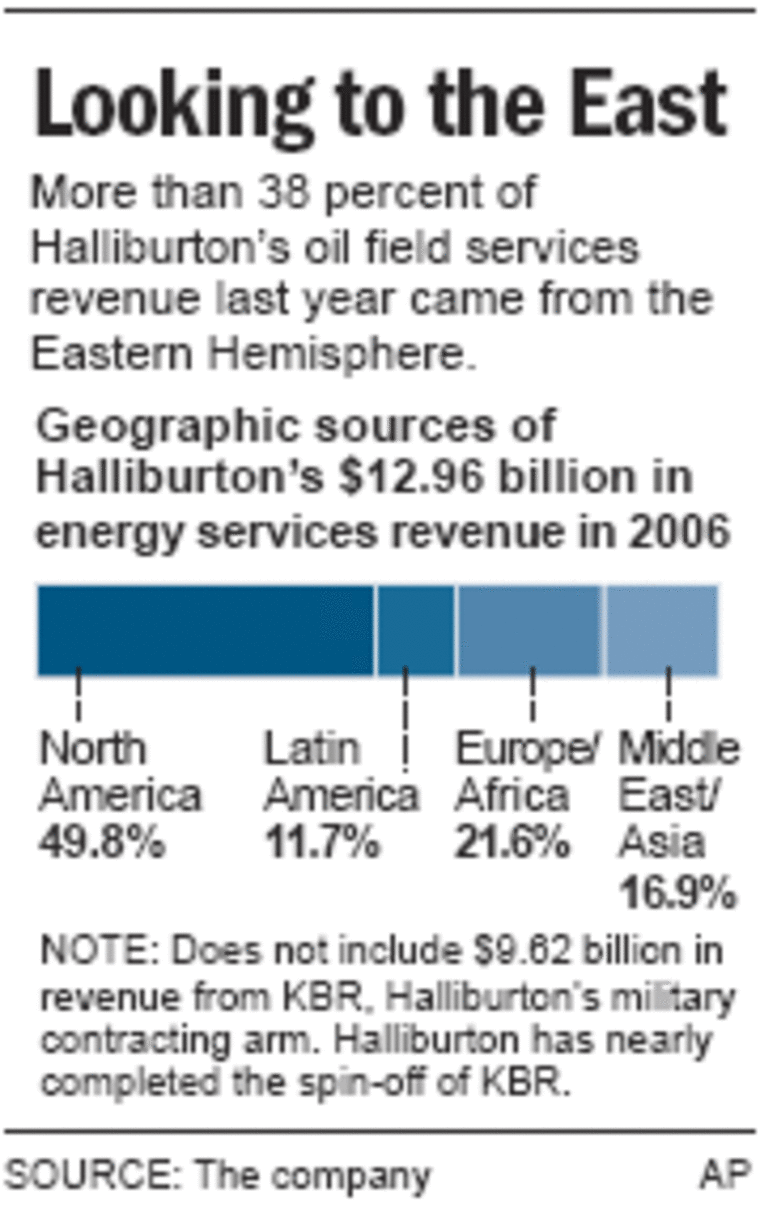Halliburton Co.'s decision to shift its CEO's offices from Houston to Dubai puts a key company post nearer to important markets — and further from some political headaches. Industry experts say that makes sense.
The oil services company insists it will gain no special tax or legal advantages from the move, and that Halliburton will keep a big presence in Texas even though its business is now global.
"There's not much oil in Texas any more," said Dalton Garis, an American energy economist at the Petroleum Institute in Abu Dhabi. "Halliburton is in the oil and gas industry and guess what? Sixty percent of the world's oil and gas is right here. If they didn't move now, they'd have to do it later."
Some Americans were startled to hear chief executive Dave Lesar's announcement Sunday that he would lead the company from a new headquarters in Dubai, the glitzy Mideast financial capital.
Halliburton has been a lightning rod for criticism because of the more than $19 billion in contracts awarded by the Pentagon to its KBR unit to be the sole provider of food and shelter services to the military in Iraq and Afghanistan. Democrats in Congress have claimed that KBR, formerly known as Kellogg, Brown and Root, benefited from ties to Vice President Dick Cheney, who once led Halliburton, and congressional Republicans.
The U.S. military now wants multiple contractors to provide those services and KBR is bidding again despite accusations from lawmakers and the Special Inspector General for Iraqi Reconstruction Office that the company abused federal rules in record-keeping on the current deal.
Still, defense analysts predict KBR and a company run by former KBR executives, IAP Worldwide Services, will each win one of the 10-year contracts scheduled to start this year and worth up to a total $50 billion.
"Where is the outrage of my Republican colleagues who treated Halliburton as if it was effectively the contractor of preference for all these years?" Rep. Ellen Tauscher, D-Calif., a member of the House Armed Services Committee, said in an interview.

Halliburton is now in the process of cutting all remaining ties with KBR, which held an initial public offering in November. Analysts have said KBR has been a drag on Halliburton earnings and the split will allow Halliburton to focus on selling oil exploration and production equipment and helping producers manage wells and reservoirs.
Rep. Henry Waxman, a California Democrat, said the criticism of Halliburton's move to Dubai reminded him of another Congressional uproar over the business-savvy emirate, when a Dubai-owned firm bought operations in six U.S. ports last March. Congress voted to force Dubai to sell the U.S. ports, a move seen here as anti-Arab.
But Rep. Spencer Bachus, R-Ala, said the argument that it's wrong to do business with Dubai or for a company to move its headquarters there risks alienating one of the strongest U.S. allies in the Middle East. "We need to consider that Dubai is a strong ally in a region of the world (where) we need strong allies desperately," he said in an interview.
Halliburton spokeswoman Cathy Mann declined on Tuesday to say how large of a staff Lesar will have at the Dubai office, citing security concerns. But she did say there will be no Houston layoffs and Halliburton will continue to employ roughly 4,000 people there, including the company's chief operating officer, chief financial officer and general counsel.
In addition, company officials said Halliburton, which has operated in Dubai for more than 40 years, will remain a U.S. corporation for tax purposes, incorporated in Delaware, and doesn't expect to reap any tax benefits from the Dubai headquarters operation.
Houston Mayor Bill White, a former deputy energy secretary in the Clinton administration, expressed little concern about the move. He noted that one of Halliburton's competitors, Schlumberger Ltd., maintains principal offices in Houston, Paris and The Hague, and has a large presence in Dubai. Schlumberger, the No. 1 oil services company, moved its U.S. headquarters from New York to Houston last year.

"He understands the global marketplace and the demands on executives," said White spokesman Frank Michel. "He's been there and done that in terms of traveling to places like the Eastern Hemisphere and Russia."
Western businesses have been pouring into Dubai to capture regional energy revenues and take advantage of some of the world's most liberal tax, investment and residency laws. Dubai charges no corporate or income tax and in many cases allows companies no restrictions on repatriating profits or importing employees.
In the Mideast, where U.S. government popularity is at an all-time low, it can be a good thing to be viewed as a locally based company, said Ehsan Ul-Haq, chief analyst of PVM Oil Associates in Vienna, Austria.
"They know that the Mideast is where the opportunities are," Ul-Haq said. "So they might want to get rid of their image as an American company."
The Middle East, home to some 60 percent of the world's proven oil reserves, has been explored and drilled far less intensively than in North America, mainly because producing wells are so large that there was little need to drill more.
But that is changing, Garis said. Rising energy demand from China, India and the United States has kicked off a new round of drilling in Saudi Arabia, Libya, Kuwait, the United Arab Emirates, Mauritania, Chad and elsewhere in the Mideast.
Giant state-run energy companies like Saudi Aramco, the world's No. 1 oil producer, are behind most of the exploration, and form Halliburton's customer base. National oil companies now control 77 percent of the world's oil production, according to Washington-based PFC Energy.
Last year, more than 38 percent of Halliburton's $13 billion oil field services revenue stemmed from sources in the eastern hemisphere, where the firm has 16,000 of its 45,000 global employees.